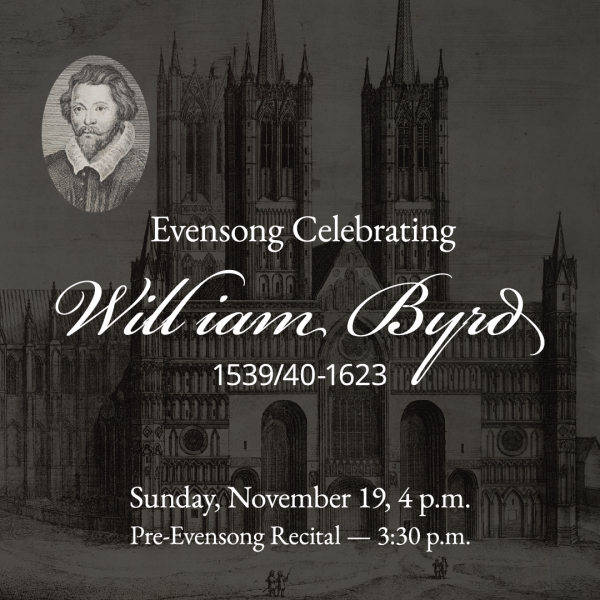Celebrating William Byrd
Posted 11/01/2023 by Kevin Jones

On Sunday, November 19, beginning at 3:30 p.m., St. Paul’s will host “Celebrating William Byrd.” As a prelude to Evensong, Stephen Plank will play an organ recital on the Hradetzky instrument featuring some of the keyboard music of Byrd. Choral Evensong follows at 4 p.m., featuring responses, canticles, and anthems exclusively by Byrd.
William Byrd, a prominent composer of the English Renaissance, left an indelible mark on the world of music through his exceptional compositions. His life and work, which spanned the late 16th century, contributed significantly to the development of English music and influenced the course of Western classical music. Byrd was born in London c. 1543, during the tumultuous reign of King Henry VIII. He was fortunate to come from a musical family and received his early musical education from his father, Thomas Byrd, a musician of some note.
Byrd’s talent was quickly recognized, and he went on to study music probably under Thomas Tallis. Byrd’s apprenticeship with Tallis nurtured his musical abilities and provided him with the foundational knowledge to create innovative compositions. Byrd’s work was heavily influenced by the religious and political context of his time. He lived during the English Reformation, a period of great religious upheaval, which saw the Church of England break away from the Roman Catholic Church. Byrd was a devout Roman Catholic in a Protestant-dominated England, which presented unique challenges and opportunities for his musical career. Because of his protection by the Queen, he became a prolific publisher of many of his own compositions, quite notably the Mass for Four Voices (1592), the two volumes of Gradualia (1605 and 1607), and a plethora of keyboard works including the Fitzwilliam Virginal Book.
Byrd’s compositions have left an enduring legacy in the world of classical music. His mastery of counterpoint and harmonic invention profoundly influenced future generations of composers, including Henry Purcell and even later luminaries like Benjamin Britten and Ralph Vaughan Williams. William Byrd’s life and music are emblematic of the transformative power of art and creativity in the face of adversity. His remarkable compositions showcase his technical skill and emotional depth. Byrd’s influence on subsequent generations of composers and his significant role in the history of English music are unquestionable. His legacy, characterized by both the beauty and complexity of his compositions, continues to inspire musicians and listeners today, making him one of the most prominent figures of the English Renaissance.
Tags: News